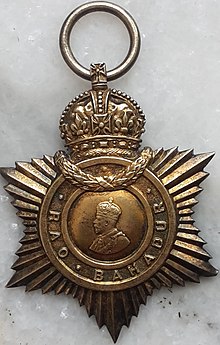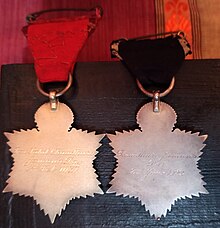Rai Bahadur
| Rai Bahadur | |
|---|---|
 Title Badge for Rao Bahadur | |
| Type | Civilian Honour |
| Country | |
| Presented by | |
| Eligibility | Hindu Indian |
| Status | Discontinued (since 1947) |
| Precedence | |
| Next (higher) | Dewan Bahadur |
| Equivalent | |
| Next (lower) | Rai Sahib |
Rai Bahadur (in North India) and Rao Bahadur (in South India), abbreviated R.B., was a title of honour bestowed during British rule in India to individuals for outstanding service or acts of public welfare to the Empire. From 1911, the title was accompanied by a medal called a Title Badge.[1] Translated, Rai or Rao means "King", and Bahadur means "Brave". Bestowed mainly on Hindus, the equivalent title for Muslim and Parsi subjects was Khan Bahadur. For Sikhs it was Sardar Bahadur.
The title was given to recognise and reward individuals who had made significant contributions in various fields such as public service, commerce, industry, and philanthropy.
Those awarded the Rai Bahadur title were usually drawn from the lower rank of Rai Sahib, both of which were below the rank of Dewan Bahadur.[2] These titles were subordinate to the two orders of knighthood: the Order of the Indian Empire and the higher Order of the Star of India. A holder of a Rai Sahib, Rai Bahadur or Dewan Bahadur title came lower in the order of precedence.[1]
Selected recipients awarded the Rai/Rao Bahadur title
[edit]Academics and education
[edit]- Pt. Sadashiva Jairam Dehadrai, Professor of Sanskrit, Jabalpur College.[3]
- Priya Nath Dutt, assistant registrar, Punjab University[4]
- S.N (Satya Nand) Mukarji, the sixth, and longest-serving (as of 2023[update]) principal of St. Stephen's College, Delhi from 1926 to 1945. (St. Stephen's is a foundation constituent college of Delhi University.) Wrangler in the Mathematical Tripos from Queens' College, Cambridge. Member, Lindsay Commission on Higher Education[5]
Activists and politicians
[edit]- Ghasiram Gathwal Malik, he was the head of Gathwala Khap (Khap of Gathwala clan) and a freedom-fighter.
- S. A. Saminatha Iyer, Indian independence activist.
- Manik Lal Joshi, chief minister of Bundi, Rajputana[6]
- Motilal Nehru, Indian independence activist, he later surrendered it during the non-co-operation movement of 1921.
- H.H Dr. Rai Rajeshwar Bali Bahadur OBE, MLA Taluqdar Raja of Rampur Dariyabad, Honorary Magistrate, Barabanki, Minister of Education, Medical Relief & Public Health and Local Self-Government of the UP Assembly
- Mahadev Govind Ranade, Indian scholar, social reformer, judge and author. He was one of the founding members of the Indian National Congress.
- Jaswantraj Mehta[citation needed] Indian politician, elected to the Lok Sabha; elected to Jodhpur State Legislative Assembly in 1947
- C. Jambulingam Mudaliar (1857–1906), Indian politician and freedom-fighter
- Gopal Hari Deshmukh, Indian writer, activist, and thinker from Maharashtra, popularly known as Lokhitwadi
- T. M. Jambulingam Mudaliar (1890–1970), philanthropist and freedom fighter who gave 620 acres (250 ha) of land to establish NLC India Limited
- Kurma Venkata Reddy Naidu, Chief Minister of Madras Presidency.
- Seth Vishandas Nihalchand, Sindhi politician, social reformer, philanthropist
- Chhotu Ram, Minister for Agriculture and Home Affairs, erstwhile Punjab, 1945. First Indian-origin Speaker of the Punjab Legislative Assembly
- Cruz Fernandez, businessman, and municipal chairman. He was the longest-serving chairman of Tuticorin municipality and is considered the father and architect of modern Tuticorin (now called Thoothukudi)
- Shyam Nandan Sahay, Founder vice chancellor of Babasaheb Bhimrao Ambedkar Bihar University, Member of the 1st Lok Sabha
Civil servants and government officials
[edit]- Pushkar Thakur, District Magistrate and Collector of Champaran. Title awarded in 1945 in recognition of his outstanding service as Special Officer for War Risks Insurance for Bihar and Orissa, covering an area larger than that of the United Kingdom, Belgium and the Netherlands combined. The Viceroy Lord Wavell personally wrote a letter congratulating Pushkar Thakur on the contribution of Bihar and Orissa in the National War Effort, which had been the highest in the country.[7]
- Jagan Nath Bhandari Raj Ratan, Dewan of Idar State[8]
- Lada Damodar Das, extrajudicial assistant commissioner in the Punjab[4]
- Dewan E.K. Govindan, writer, civil servant and ruled the first malayali man Pudukotta administratively, then served as Dewan of Pudukotta[9]
- Dewan Jaggatnath, secretary to the municipal committee and district board, Dera Ismail Khan[6]
- Sahu Parsotam Saran Kothiwala, member of the district board, Moradabad[4]
- Lala Jai Lal, member of the Municipal Committee, Simla[4]
- A. Savarinatha Pillai, Assistant Commissioner of Income Tax, Madras Presidency; winner of King's Coronation Award for Distinguished Public Service, London[10]
- Akshey Kumar Sarkar, superintendent, Department of Commerce and Industry, Government of India[6]
- Betharam Sarma, sub-deputy collector, Tezpur, Assam[4]
Commerce and industry
[edit]- Jamnalal Bajaj, industrialist; Bajaj later returned the title[11]
- Dewan Bahadur P. Somasundaram Chettiar, Coimbatore - industrialist and pioneer in textiles.[12]
- Jagmal Raja Chauhan (1887–1974), better known as "Rai Bahadur Jagmal Raja", industrialist and railway contractor, private banker, aviation pioneer and philanthropist
- Jairam Valji Chauhan MBE (or "Chouhan"; 1892–1956), better known as "Rai Bahadur Jairam Valjee", was a Kutchi railway contractor, mill-owner, miner and philanthropist, at Jairamnagar and Raigarh
- Devraj Daya of Jharsuguda — a Kutchi railway contractor, philanthropist.[13]
- Seth Sarupchand Hukamchand (1874–1959) of Indore, Holkar State, merchant–industrialist and a prominent leader of the Jain community [6]
- Gujar Mal Modi, founder of the Modi Group
- Mohan Singh Oberoi, founder of Oberoi Group

- Jamuna Das Choudhury of Sahebganj, Muzaffarpur, industrialist[14]
- Hariram Goenka (1862–1935), businessman and cofounder with his brothers, including Badridas Goenka, of Goenka group of Kolkata
- Badridas Goenka CIE (1883–1973), industrialist and business tycoon; cofounder of the original Goenka Group from Kolkata, of which the RPG Group is a successor; first chairman of the State Bank of India
Engineering, science and medicine
[edit]- Kailash Chandra Bose CIE OBE, first knighted Indian physician.[15]
- Upendranath Brahmachari FRSM FRS (1873–1946), Bengal-born physician and scientist. Synthesised urea stibamine, determining its effectiveness as a treatment for the disease Kala Azar
- Balkishen Kaul, surgeon, lecturer, and superintendent of Lahore Medical college[4]
- Puttana Venkatramana Raju (1894–1975), civil engineer, industrial advisor to government of India, educationist
- Ram Dhan Singh, pioneer agricultural scientist, principal, College of Agriculture, Lyallpur, erstwhile Punjab, 1947[16]
Law and justice
[edit]- Babu Ram Sadan Bhattacharji, deputy magistrate, Bengal[4]
- Chaudhary Dewan Chand Saini MBE, (born 1887) of Gurdaspur, Punjab, distinguished lawyer of Punjab High Court, leader of the criminal bar; elected member of Legislative Council of colonial Punjab
- Rajendranath Dutt, judge, Bengal[4]
- Soti Raghubans Lal, subordinate judge, Shahjehanpur[4]
- Sadh Achraj Lal, honorary magistrate and member of the municipal board, Mirzapur[4]
- Jwala Prasad, government pleader[4]
- Raghunath Sharan, District Judge in Bihar[17]
- Babu Bahadur Singh, honorary magistrate, Pilibhit[4]
- Babu Shuhrat Singh, Zemindar of Chandpur and honorary magistrate, Basti[4]
- N S Nanjundiah (1879–1953), of Nanjangud distinguished advocate of Chief Court of Mysore and a sheristadar.[18]
Literature and arts
[edit]- Appu Nedungadi, author of Kundalatha, the first novel published in Malayalam
- M.V. Dhurandhar FRSA, noted painter and postcard artist who was an alumnus of the Sir J.J. School of Art in Mumbai, where he was also later a professor
Philanthropy, religion and charity
[edit]- T. Rattinasami Nadar, founder of Nadar Mahajana Sangam efforts of T. Ratnasamy Nadar, in 1910. There are several schools and colleges under the control of Nadar Mahajana Sangam
- Ranchhodlal Chhotalal, textile mill pioneer and philanthropist
- Dharmarathnakara Arcot Narrainsawmy Mudaliar, philanthropist
- Amba Prasad, philanthropist of Delhi
- Salig Rām (1829–1898), Postmaster-General for North-Western Provinces; disciple of Shiv Dayal Singh, later succeeding him as guru. Often known by the honorific "Huzur Maharaj"
- Ranadaprasad Saha, philanthropist
- Yele Mallappa Shetty (1815–1887), philanthropist who constructed Bangalore's first obstetrics hospital, funded Vani Vilas Hospital construction, and restored Kaadu Malleshwara Temple, Bangalore. The name of the Yele Mallappa Shetty Lake commemorates his contribution to the construction of drought-relieving water storage in the Bangalore region[6]
- Sardar Bahadur Jagat Singh (Sant) (1884–1951), Lyallpur, pre-partition Punjab Surat Shabd Yoga practitioner and guru
- Gubbi Thotadappa, businessman, philanthropist, founded Dharmachathra (free lodging places for travellers) and free hostels for students throughout Karnataka
Police and emergency services
[edit]- Tirath Singh Bakshi, Deputy Inspector General of Police, United Province
- Purna Chandra Lahiri, Indian Police officer, Calcutta
- P. K. Monnappa, South Indian Police Chief of three states, Madras, Hyderabad and Mysore.
- Jacob Devasahayam, Deputy Inspector General of Police, Madras[19]
- Satyen Nath (S.N.) Mukherjee, First Indian-origin Deputy Commissioner of Indian Police, Calcutta[20][21][22]
Other
[edit]- Babu Nalini Kanta Ray, Dastidar[clarification needed] of Assam[4]
See also
[edit]References
[edit]- ^ a b H. Taprell Dorling. (1956). Ribbons and Medals. A.H.Baldwin & Sons, London. p. 111.
- ^ Jalan, Aditya (2009). "Dewan Bahadur 1944–1954". Quila House and the Jalan Collection: A Brief Introduction. Retrieved 29 July 2018.
- ^ Who's Who 1911 Coronation Edition, Lucknow, Newul Kishore Press, 1911 (page 27)
- ^ a b c d e f g h i j k l m n The Indian biographical dictionary, by C. Hayavando Rao, 1915 (page 26)
- ^ Several sources:
- Linsay Commission:
- Mayhew, Arthur (October 1931). "The Commission on Christian Higher Education in India". International Review of Mission. 20 (4): 512–524. doi:10.1111/j.1758-6631.1931.tb04099.x.
- St Stephens, Cambridge University and the Mathematical Tripos, and general background:
- "VISIONARIES – St. Stephen's College, Delhi". St Stephen's.
- "St. Stephen's College, Delhi, India: HISTORY". Tufts.edu.
- Bhattacharji, Jaya (April 1995). "Remembering Principal Mukarji". The Stephanian. Vol. CIII, no. 1. pp. 1–5. Archived from the original on 28 June 2021. Retrieved 15 July 2021.
- Linsay Commission:
- ^ a b c d e The Indian biographical dictionary, by C. Hayavando Rao, 1915 (page 27)
- ^ MM Thakur, Myself Surprised, pg 88, https://linguae.weebly.com/uploads/3/6/5/7/3657496/myself_surprised.pdf
- ^ Bhandari Jagan Nath Rai Bhadur, Raj Ratan, Dewan of Idar State, The Times of India directory and year book including who's who, Volume 32, 1945
- ^ The Who's who in Madras: ... A Pictorial Who's who of Distinguished Personages, Princes, Zemindars and Noblemen in the Madras Presidency. Pearl Press. 1939.
- ^ "Caste and Capitalism in Colonial India".
- ^ "Jamnalal Bajaj". The Print. 11 February 2019. Retrieved 14 June 2020.
- ^ Govindarajulu, Rajesh (2015-07-03). "Pioneers in textile". The Hindu. ISSN 0971-751X. Retrieved 2021-01-23.
- ^ Lewis, Sir Hawthorne (1954). Speeches Delivered by His Excellency Sir Hawthorne Lewis, ..., Governor of Orissa, 1941–1946. Government of Orissa. pp. 13, 35. Retrieved 10 April 2024.
- ^ Datta, K. K. (1958). History of the Freedom Movement in Bihar (1942–1947). Vol. 3. Patna, India: Government of Bihar. p. 237.
- ^ "Sir Kailas Chandra Bose". The Indian Medical Gazette. 62 (4): 235–237. 1927. PMC 5197519.
- ^ "Biography of Ch. Ram Dhan Singh". Dr Ramd Dhan Singh.
- ^ "Former District Judges since the Creation of the Judgeship". District Court in India | Official Website of District Court of India.
- ^ "Rao Bahadur N. S. Nanjundiah".
- ^ London Gazette, Friday, 4th June, 1948
- ^ Channa, Subhadra Mitra; Channa, Subhadra (2013-09-05). Gender in South Asia. Cambridge University Press. ISBN 978-1-107-04361-9.
- ^ Gupta, G. S. (1991). Free Masonry in India. G. S. Gupta (IAS).
- ^ Indian Factories & Labour Reports: Deputy Commissioner S. N. Mukherjee. Law Publishing House. 1963. Supreme Court of India.
